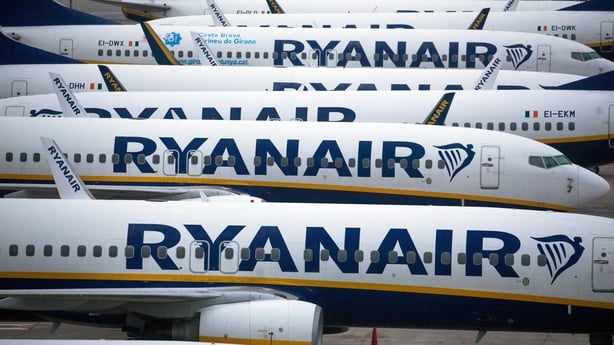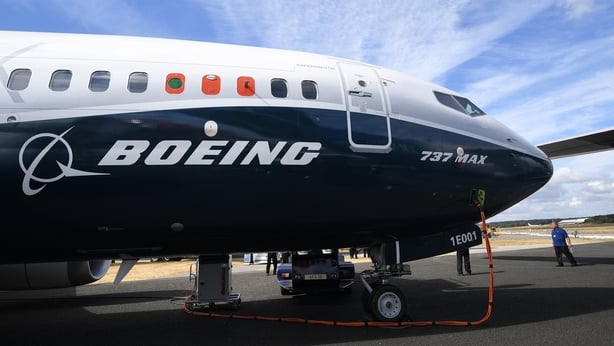Ryanair has said a return to pre-Covid levels of profitability this year was not certain even as the carrier topped first-quarter profit estimates.
The after-tax profit of €170 million for the quarter ended June was ahead of estimates of €157 million in a company poll of analysts, but well short of the €243-million profit in the same quarter of 2019.
Chief Executive Michael O'Leary said fares for the July-September quarter, typically its most profitable period of the year, were higher than 2019 levels by a low double-digit percentage.
Unpredictability around fuel prices, Covid-19 and geopolitical risks make it impossible to forecast profit for the full financial year which ends on March 31, 2023, he said.
Ryanair expects profitability and margins to return to pre-Covid levels, but the company is not certain whether that will be achieved in the current or next financial year, Mr O'Leary said in a video presentation.
We need your consent to load this rte-player contentWe use rte-player to manage extra content that can set cookies on your device and collect data about your activity. Please review their details and accept them to load the content.Manage Preferences
Ryanair posted a profit of €1 billion in its pre-Covid financial year 2020, with 148 million passengers compared to the 165 million people it plans to fly this year.
"Any guidance is subject to a very rapid change from unexpected events which are well beyond our control during what remains a very strong but still fragile recovery," Mr O'Leary said.

Traffic during the three month period recovered strongly to 45.5m passengers, up from from 8.1m during the same period last year.
However, Ryanair said Russia's invasion of Ukraine in February damaged Easter bookings and fares.
As a result, it said average fares were down 4% on the same quarter pre-Covid.
Neil Sorahan, Chief Financial Officer, said Ryanair did reallocate that capacity fairly quickly, and the airline is now looking at very strong passenger numbers for the balance of the year. "We're targetting 150 million passengers on a full year basis, an 11% increase on what we did pre-Covid."
Ryanair recorded a significant 560% increase in fuel to €1 billion.
Mr Sorahan said the airline was "unique in that we are 80% hedged on our fuel bill for the current financial year, just over $66 a barrel, which to put that in context is well below the $100 a barrel at which it's trading today."

He said it gives the airline a relatively strong competitive advantage into the winter, but the 20% that's unhedged will continue to see increases from spikes in fuel costs.
The CFO said staffing levels at airports in Europe had been disappointing, especially given that it had provided schedules months in advance.
"Most of them in fairness, staffed up accordingly," he said. "There were some issues in Dublin, Manchester and elsewhere, but to be fair, I passed through Dublin Airport yesterday afternoon and things have improved somewhat so hopefully the staffing numbers are getting up."
He added that the largest issue Ryanair faced was "unprecedented air traffic control delays" due to staffing issues. He said he hoped it would improve ahead of summer 2023.
As traffic grew, total revenues increased by 600% to €2.6bn.
The figures show that net debt at 30 June fell to €0.4bn, down from €1.5bn at March 2022.
Stockbrokers Goodbody described the release as "a very strong set of numbers".
Citi said a Q1 cost outperformance and Q2 pricing comments were "likely to drive FY consensus upgrade."
Ryanair is, however, unlikely to return cash to shareholders in the its current or next financial year as it will be focused on paying down capital expenditure, Mr Sorahan said.
"Our objective over the next two years is to manage our peak capex" and repay bonds.
"That is where we will be focused," he said.
Ryanair voices concern over Boeing delays and MAX 10 certification
Meanwhile, Ryanair said today that Boeing had warned it of possible delays to 21 737 MAX aircraft due for delivery before the end of the year and said it was also worried about the certification of the new MAX 10 aircraft.
Boeing remains a "major area of concern" for Ryanair, one of the US aerospace giant's leading customers, Group Chief Executive Michael O'Leary told investors on a call following the release of quarterly results.
Boeing did not immediately respond to an emailed request for comment.

Mr O'Leary said he was confident that Boeing would deliver all 50 737 MAX aircraft due by next summer but he was concerned about a possible repeat of delays this year that forced it to take deliveries during its busy summer season.
"In the last two weeks, we're getting letters out of Boeing telling us there might be problems with 21 aircraft this side of Christmas," Mr O'Leary told investors on a conference call.
A delay would be "inexplicable and unacceptable," he added.
O'Leary said that he had been assured that Ryanair deliveries would take priority this winter.
"Management in Seattle... need to get their finger out," Mr O'Leary said, repeating a call for a change in management at Boeing's Seattle operations.
Mr O'Leary said he was still interested in a large order for the MAX 10 - the largest member of its best-selling single-aisle airplane family - but that Boeing had not offered attractive enough pricing yet.
"We would hope eventually they will get there," he said.
Ryanair last year walked away from negotiations with Boeing for 200 of the MAX 10.
The MAX 10 programme, which has not yet been certified, received a boost at Britain's Farnborough Airshow last week with Delta Air Lines ordering 100 and Qatar Airways 25.
Mr O'Leary said he was worried about delays to the certification and the possibility that the cockpit would have to be redesigned.
Boeing faces a December deadline to win approval for the 737 MAX 10, otherwise it must meet new cockpit alerting requirements under a 2020 law, unless waived by Congress

